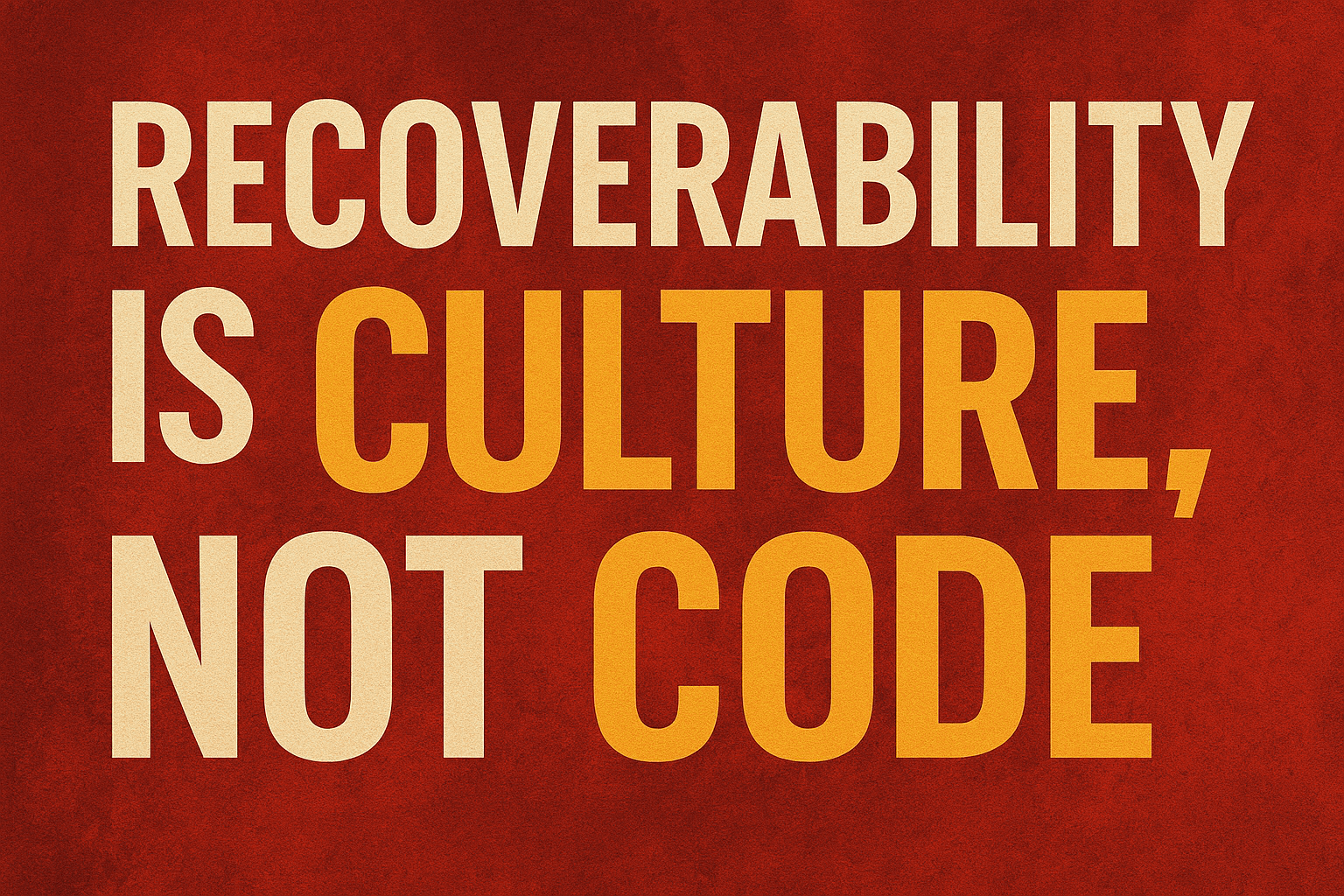Recoverability is too often treated as a checklist of systems and backups, but in reality, it lives and dies by culture. This piece reframes recoverability as a human and organisational challenge, shaped by trust, clarity, ownership, and adaptability. It draws on psychology and real-world failure scenarios to show that the ability to bounce back doesn’t depend on tools alone; it depends on how people behave under pressure.
This article was inspired by the recent cyber attacks across UK retail, specifically Marks & Spencer’s and the Cooperative, plus the Harris Federation (of Schools), as reported on BBC Radio 4’s Today Programme (01/05/2025). This interview will be unavailable after a month, but you can still read excerpts at “Inside the Breach: What M&S and the Harris Federation Reveal About UK Cyber Vulnerabilities“.
When a cyber attack hits, everyone looks at the systems. Were the backups in place? Was the firewall configured correctly? Did the EDR catch it?
But here’s the truth, most recovery audits ignore: systems don’t bounce back, people do.
You can automate detection. You can outsource remediation. But when it comes to recoverability, the ability to return to functional, stable operations, it’s the behaviour, mindset, and coordination of people that determine how fast (or whether) you get back up.
What Actually Happens After the Breach?
The immediate aftermath of an incident rarely plays out like a polished runbook. Instead, you’ll see:
- Confusion about who is authorised to make critical decisions
- Paralysis due to fear of blame or job loss
- Delays caused by unclear escalation paths
- Overloaded staff reverting to instinct, not protocol
- Communication breakdowns between departments or teams
These aren’t system failures. They’re cultural fractures, cracks in trust, clarity, and confidence that widen when stress hits.
At Psyber Inc., we study these behavioural dynamics, not to shame organisations, but to help them understand where resilience truly lives: in culture.
The Human Factors of Recovery
What distinguishes organisations that recover well from those that spiral into chaos? Three things:
- Psychological Safety
Teams that feel safe reporting problems without fear of punishment act faster and more transparently. - Clear Ownership
When everyone knows their role in recovery, without overlaps, gaps, or second-guessing, progress accelerates. - Embedded Adaptability
No plan survives first contact. Recoverability means teams feel confident enough to adapt while staying aligned.
In our experience, the presence or absence of these factors has more impact than whether an incident response plan was technically correct.
Culture Sets the Tempo
Recovery is not a mechanical process. It’s emotional. Your people are under pressure. They’re tired. They’re afraid of getting it wrong. Culture is what determines whether they freeze or step forward.
Do your staff feel they’ll be backed or blamed?
Do your leaders default to silence or to trust?
Do your teams see chaos as failure or a challenge to overcome together?
These aren’t soft questions. They’re core recovery metrics.
At Psyber, we assess this through behavioural diagnostics, resilience workshops, and embedded team feedback loops. We help turn post-breach response from reactive scrambling into measured recoverability.
Systems Help. Culture Decides.
It’s easy to point to dashboards, timelines, and tools. But every CTO or CISO who’s been through a real incident knows: technology gives you potential, culture determines your outcome.
The most secure backup is worthless if no one knows how to restore it. The best IR playbook is useless if no one feels empowered to act on it. And no recovery succeeds if departments retreat into blame.
Conclusion: Code Is a Tool. People Are the Recovery.
Want to know how fast your organisation will recover from a breach? Don’t just check the systems, check the people. Ask:
- Do we know how we behave under pressure?
- Do we talk about failure openly?
- Do our people trust each other enough to act?
Recoverability is culture, not code. If you want to recover faster, build the kind of culture that’s already halfway there.

